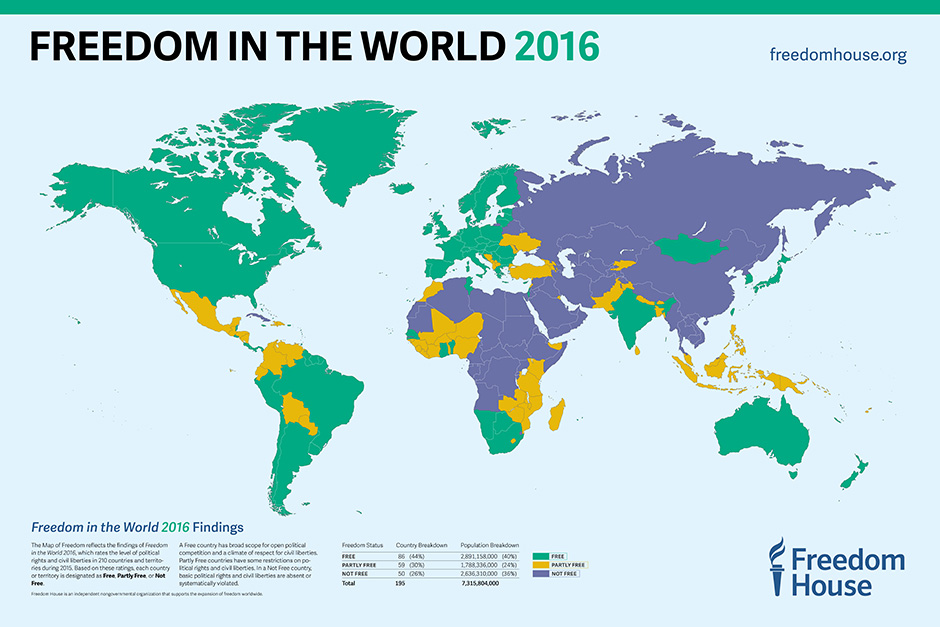The beginning of the report summarizes the situation:
The world was battered in 2015 by overlapping crises that fueled xenophobic sentiment in democratic countries, undermined the economies of states dependent on the sale of natural resources, and led authoritarian regimes to crack down harder on dissent. These unsettling developments contributed to the 10th consecutive year of decline in global freedom. [emphasis added]
Key findings from the report:
- Over the past 10 years, 105 countries have seen a net decline, and only 61 have experienced a net improvement.
- Ratings for the Middle East and North Africa region were the worst in the world in 2015, followed closely by Eurasia.
- Over the last decade, the most significant global reversals have been in freedom of expression and the rule of law.
Unfortunately, there was little to no overall progress for women in 2015:
[W]omen remain at a distinct disadvantage around the world in terms of political rights and civil liberties. Despite modest increases in women’s political representation and the election of a number of female heads of government, examples of genuine progress are few and far between. The very limited steps that were hailed as victories in 2015—that women in Saudi Arabia, who must still obtain a male guardian’s permission to conduct many basic daily activities, were finally able to participate in tightly controlled elections for largely powerless municipal councils, or that a ridiculously outdated law criminalizing adultery was struck down in South Korea—demonstrated just how low the bar has gotten in evaluating progress toward gender equality. Meanwhile, in many parts of the world, women’s economic aspirations and the broader economies of their countries continue to suffer from unequal rights to property and inheritance as well as discriminatory practices that prevent women from working outside the home.
The United States, though one of the freest nations in world, was given a negative trend arrow by Freedom House:
The United States received a downward trend arrow because of the cumulative impact of flaws in the electoral system, a disturbing increase in the role of private money in election campaigns and the legislative process, legislative gridlock, the failure of the Obama administration to fulfill promises of enhanced government openness, and fresh evidence of racial discrimination and other dysfunctions in the criminal justice system.
The report did include some positive news: “Citizens in a number of other troubled societies similarly proved that change was entirely possible, and did so through the most tried-and-true democratic institution–the ballot box.” There were several examples of election outcomes that may bring about positive change in politically tumultuous countries. Nigerian voters rejected the corrupt incumbent, Goodluck Jonathan and elected Muhammadu Buhari, who has worked to address government corruption and increase military power in the fight against Boko Haram. The people of Sri Lanka chose Maithripala Sirisena over President Mahinda Rajapaksa. Not only has Sirisena worked to repair relations with minority groups and international communities, but he also overturned some of the repressive policies enacted by the divisive and authoritative Rajapaksa.
As we continue into 2016, there are several countries for which Freedom House raised ongoing concerns:
- Angola: Squeezed by low oil prices, Angola’s autocratic government is likely to intensify suppression of dissent and expand surveillance of private citizens.
- Bosnia and Herzegovina: The country could face even worse government dysfunction if a planned Bosnian Serb referendum on the national court’s legitimacy takes place.
- Democratic Republic of Congo: With the army poised to crush protests, President Kabila is considering a constitutional amendment that would allow him to seek a third term in 2016.
- Iran: Moderate reformists are preparing for critical February elections to the parliament and the Assembly of Experts, the body that appoints the supreme leader.
- Kuwait: Authorities are quashing dissent with increasing aggression and frequency, galvanizing concerns about citizenship revocation and use of the death penalty.
- Malaysia: Political repression in Malaysia could intensify as the prime minister faces increasing pressure over an embezzlement scandal.
- Myanmar: Once the newly elected legislature is seated and a government is formed, the National League for Democracy will be under pressure to deliver on its promises.
- Nigeria: Observers will be able to assess President Buhari’s first year in office, including his efforts to combat entrenched corruption and Boko Haram militants.
- Poland: The initial actions of the Law and Justice government in 2015, including attempts to stack key institutions with partisan loyalists, raise serious concerns about Poland’s trajectory.
- Venezuela: Although the opposition triumphed in the legislative elections, it will need a well-crafted strategy to enact reforms in light of possible resistance by President Maduro.
Visit Freedom House’s Freedom in the World 2016 page for more info-graphics and information. For information about how Freedom House ranks nations and criteria used, visit their Methodology: Freedom in the World 2016 Page.
